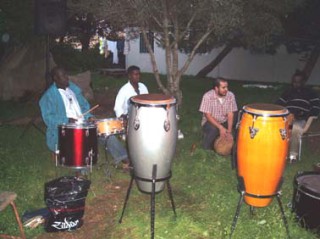Ghettos on Malta

January 24, 2009
By Marika Azzopardi
Published in The Malta Independent
It is the same story over again. People who want to go to Europe end up in Malta and become embroiled in a situation that sees them unwilling captives on an island that hosts them unwillingly, whilst some legal, international, European or African, technicality is being resolved elsewhere. And in the meantime war goes on in their country, their family members grow older and further apart, time is lost and lives stand on hold, in oblivion. Yet, we have to pause and think before blurting out haphazard statements – if the perilous weather conditions of a wintry Mediterranean sea cannot deter these migrants from risking a crossing, things must be really bad where they come from.
Fr Dionysius Mintoff tries hard. He works unstintingly with the poor people of Hal Far, the poor people who visit the Peace Lab each and every day asking for help, for support, for supplies. They are the poor people of Africa who are even poorer, even in Malta. He knows the Maltese people cannot support this situation for very much longer and he knows the people of Africa are pawns in an international gamble that cannot be resolved any time soon and which very few really care to solve. Yet, he keeps trying to find solutions.
He does his best to organise events that will keep communication levels high and its channels wide open. Last Sunday, World Refugee Day, the Peace Lab organised a successful repeat of last December’s Open Day when Asylum Seekers congregated with members of the Maltese public who were interested in sharing moments of African and Maltese culture.
Dance, laughter, talk. Some tea and music – tribal sounds from Africa, folklore dance from Malta. Fr Dionysius recalls the words of one of the organisers who coined the whole event a ‘spontaneous fusion’. It is merry-making that tries hard to ward off ill-feelings and to somewhat dispel the harshness of reality.
A reality which surfaces during Holy Mass at the Peace Lab, when images of distressed people who land here on boats, are shown on the big screen within the tiny chapel and the words of a Somali man reverberate in tandem… “There was an island in front of us, it was Malta. I didn’t want to go there, nobody wanted to go there; we all knew it is a small island and that so small a country cannot give shelter to all the people escaping from Africa because of war and famine.” But ultimately when fear of stormy waters takes over, when the boat is intercepted by law and order, there is really no choice.
The Somali man laments, even whilst knowing that detention of its very nature, must be tough. “I would like simple things – sleeping in a bed, not on a mattress on the floor; a door for the women’s showers when my wife is washing herself; hot water, electricity…. We are too many people in so small a space and we cannot wash properly our clothes and our blankets. It is so dirty here.”
As I sit writing, I watch the rain dismally. It’s been raining all day – a long, wet, dull day. My feet are cold, my hands are cold, but I have a de-humidifier and a heater for company and at least I am dry. I wonder about the people returning to the tents this afternoon and finding all their possessions, probably, soaking wet.
I listen to the news – Gaza is burning, the British are trying to save their banks, Obama is being inaugurated as president soon. And then I read a news article on a recent issue of The Guardian Weekly which talks about how ‘Malta grapples with influx of immigrants’. Perhaps we should look closer at our own shores to discover what Aidan Jones refers to as being “ ….2,000 (men & women) in ramshackle camps” and “…two cramped, unsanitary open centres that are effectively African ghettos.”
Ghettos on Malta? Yes. Jones writes of the Maltese reality and the fact that the Maltese are hardly to blame for the situation they’ve been handed, even though Malta’s 18-month-long detention policy is being openly criticised. It is easy for an outsider to speak up about such a problem. Yet no outsider has well and truly come up with any real solution to the problems of the Africans on Malta, to the Maltese problem. After all, this African problem that is also a European problem, has well and truly become a very real problem of the Maltese and one which won’t be disappearing very quickly.
Meantime, Fr Dionysius worries and frets.
For the very same reasons that Jones recites in his article.

